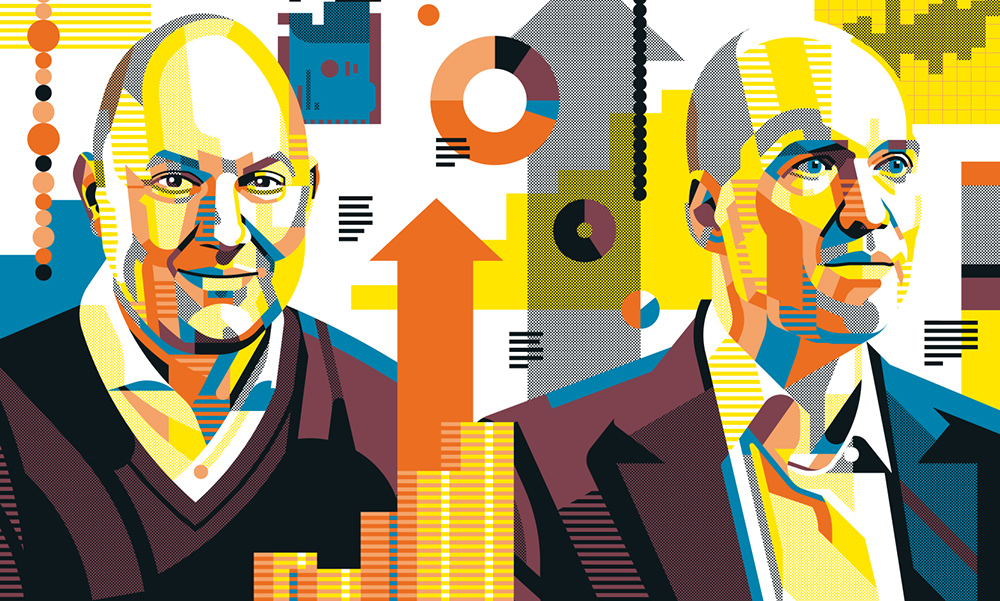 欢迎来到矩阵。马克·安德森(左)和本·霍洛维茨打造了一台强大的机器,帮助创业公司做大做强,同时也为他们自己和投资者赚得巨额回报。图片来源:ILLUSTRATION BY ALEKSANDAR SAVIĆ; REFERENCE PHOTOS BY BRYCE DUFFY; STEPHEN LAM—REUTERS
欢迎来到矩阵。马克·安德森(左)和本·霍洛维茨打造了一台强大的机器,帮助创业公司做大做强,同时也为他们自己和投资者赚得巨额回报。图片来源:ILLUSTRATION BY ALEKSANDAR SAVIĆ; REFERENCE PHOTOS BY BRYCE DUFFY; STEPHEN LAM—REUTERS今年11月的第一周,两位声名显赫的风投大佬,马克·安德森和本·霍洛维茨,在财力雄厚的捐赠基金、主权财富基金和养老金计划等支持者的面前上演了一场秀。
为期三天的活动是在这家风投公司支持的在线平台Hopin上举行的。除线上活动之外,他们还在纽约市和旧金山的高档寿司店Pabu Izakaya盛情款待了100多位贵宾。
尽管令人晕眩的经济数据、俄乌冲突和美国中期选举等杂音,不停地干扰观众的注意力,但安德森·霍洛维茨公司(Andreessen Horowitz,简称a16z)的基金经理们还是言之凿凿地宣称,市场动荡和科技股暴跌其实是一个机会。
此时此刻,a16z的合伙人或许比以往任何时候都更需要给人留下深刻印象。
2021年年底,也就是a16z成立十年后,这家风投巨擘还在高歌猛进,旗下资产高达550亿美元,是2020年的三倍多。即使按照硅谷风投的高标准来看,这也是一个巨额数字。它所代表的,是a16z利用互联网热潮褪去后最好的科技投资窗口,积攒下来的创业和加密公司股权。
近一年后的今天,a16z 正在应对公司成立以来最糟糕的科技市场。今年迄今为止,曾经为公司斩获史上最高回报的数字货币交易平台Coinbase的股价暴跌了约80%。一些目前已经上市的投资项目,例如爱彼迎(Airbnb)和Affirm,也经历了股价暴跌的洗礼。包括Instacart在内,几家未上市的投资组合公司纷纷大幅下调估值。与此同时,随着一家头部加密货币交易所轰然倒塌,整个数字资产行业,连同a16z投下的数十亿真金白银,顿时陷入前途未卜的窘境。
“a16z曾经创下笑傲同业的佳绩……但今时不同往日。”哥伦比亚商学院(Columbia Business School)的教授莱恩·谢尔曼这样说道。
变幻莫测的市场让许多投资者成了惊弓之鸟,开始重估自己的赌注。事实上,并非只有投资者这样做。就连a16z自身也将目光投向风投业务之外的广阔领地,寻求转型为一家全能型金融机构,以利用新的资金池,并经受住创业融资环境的无常变化。
这场变革始于几年前,但在今天显得尤为迫切。其目的是帮助公司重新定位,最终成为一家堪比高盛集团(Goldman Sachs)和摩根大通(J.P. Morgan)的金融大鳄。a16z将为有意投资科技领域的资金提供全方位服务。据消息人士透露,该公司拟定于2023年1月推出私人财富管理服务,为企业高管的个人资金开启投资之门。此前效力于泛大西洋投资集团(General Atlantic)的大卫·乔治被委以开拓公开市场投资业务的重任。此外,越来越多的学者和政策专家受聘加入。a16z的在册员工人数目前已经超过500人,较2021年7月的240人大幅增加。
从某种意义上说,a16z正在践行它传授给创业公司的壮大秘诀——把发展作为第一要务,同时设法规避随之而来的致命风险。几乎可以肯定的是,凭借着过去七年筹集的350多亿美元资本,a16z每年仅管理费一项就能够进账约5亿美元。随着公司不断开辟新市场,这个数字注定会继续攀升。
“他们正在进行大量试验。”一位a16z的前投资合伙人表示,“在我看来,一些项目免不了会失败。但反过来说,其中一些会大获成功。”
出于诸多原因,风投公司,尤其是a16z或许不能继续扩张下去。一方面,不断增长的基金规模和赌注,恐怕难以带来足以吸引有限合伙人的超额回报。另一方面,a16z可能会发现,在迥异于私人市场的公开市场上,它无法像过去那样游刃有余。此外,一些明星合伙人或许不甘心继续在滚滚车轮上充当一个籍籍无名的齿轮,他们可能会另起炉灶,打造自己的品牌。
与此同时,51岁的联合创始人马克·安德森不断卷入各种风波。身为Facebook董事的他,最近安排a16z出资支持两位遭到这家社交媒体放逐的高管创建新公司。安德森对媒体日益鄙视。在他的推动下,a16z豪掷近4亿美元襄助埃隆·马斯克以440亿美元的价格收购推特(Twitter),而这笔历经波折的收购交易几近沦为一场闹剧。在这些交易中,安德森将“创始人至上”的理念体现得淋漓尽致,但在风投世界之外,这种投资方式很难获得认可。
尽管a16z对转型计划三缄其口,合伙人也不愿意公开谈论此事,但《财富》杂志还是采访到了二十多位内部人士、有限合伙人、投资组合公司,以及前合伙人和风投对手,从而有机会更清晰地窥探风投行业中最具雄心的“探月计划”。
根据安德森的描述,他的公司是一扇引领创业者进入“矩阵”(Matrix)的门户。在那里,创业者可以突破传统商业现实的预期和束缚,按照自身意愿来塑造宇宙。安德森在今年10月发布的YouTube节目中表示:“每当创始人选择跟我们合作,霍洛维茨和我经常说的一句话是,这就像插入矩阵——你由此进入了一个任你大展宏图的世界。”在a16z重新起航之际,这两位传奇风投家自身或许也需要这个概念的护佑。
牛仔资本家
2011年,马克·安德森发表的名作《为什么软件正在吞噬世界》(Why Software Is Eating the World)引发巨大反响,而彼时的a16z已经惹人注目地进驻毗邻硅谷,风投云集的沙山路(Sand Hill Road)。
安德森作为网页浏览器之父的神秘感,本·霍洛维茨因为操盘多家创业公司而享有的公信力,以及公关专家玛吉特·温马赫斯卓越的营销能力,为这家公司创造了一种精英光环,尽管它只是刚刚加入风投俱乐部的新成员。
2009年,两位创始人推出价值3亿美元的首期基金,并积极接受媒体采访,慷慨分享奋斗秘史。他们告诉《财富》杂志,1996年,当时供职于网景(Netscape Communications)的霍洛维茨对高层向媒体泄露消息深感不满,随即给老板发了一封尖酸刻薄的电子邮件。
他的老板,时任网景首席执行官的马克·安德森回复称:“我们快要被微软(Microsoft)搞死了!搞死了!搞死了!是你在摧毁公司的价值,这完全是服务器产品经理的错。我就想帮个忙。下一次,你自己去接受那该死的采访吧,混蛋!”
两年后,即1998年,安德森以42亿美元的价格将网景卖给了美国在线(AOL)。随后,他和霍洛维茨联手创办了数据中心自动化公司Loudcloud,并在2007年以16亿美元的价格将其出售给了惠普(Hewlett-Packard)。
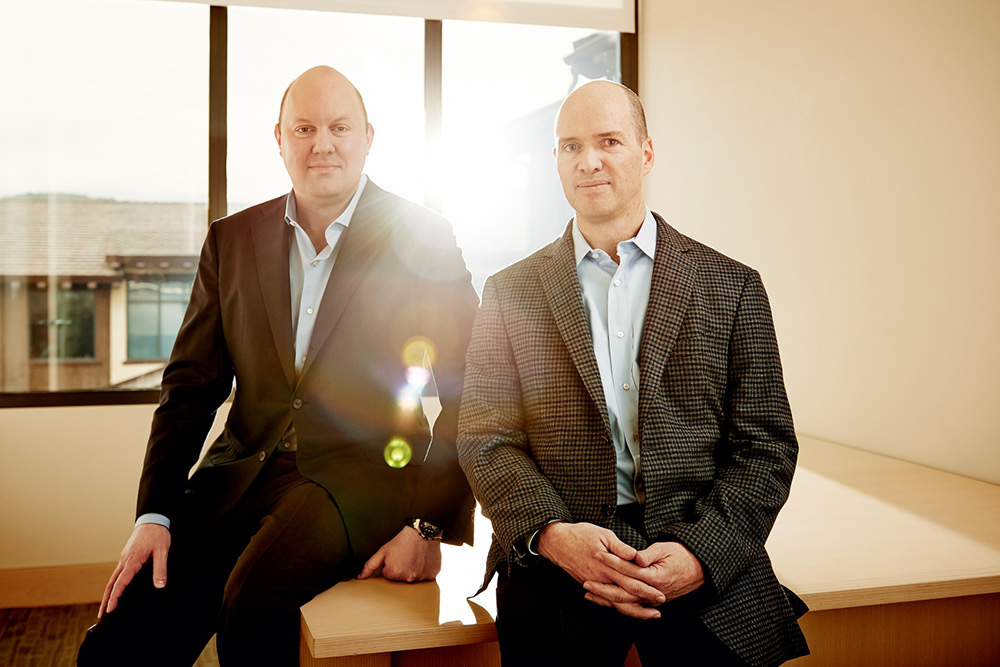
接下来,他们就一头扎进风投世界。不苟言笑的霍洛维茨负责公司运营。具有超凡魅力和远见卓识的安德森,则是公司的形象代言人和核心卖点:这是一只由创始人建立、面向创始人的基金,拥有庞大的运营团队和深厚的行业人脉,致力于帮助创业公司做大做强。
“创始人至上”的理念贯穿于公司运作的方方面面。与创始人会面每迟到一分钟,合伙人就会被罚款10美元。拒绝创业公司的融资方案后,合伙人必须在第一时间说明具体原因。对于那些遭到拒绝的创始人,公司还会进行名为“净推荐人得分”(Net Promoter Score)的反馈调查,以评估其融资体验。
“所有人都怕惹创始人不高兴,我觉得这是一件好事情。”一位前投资合伙人说。
公司文化鼓励员工挑战彼此的假设。“为了推动公司上下践行这种精神,马克和本经常选择在公开场合反驳对方的观点。”另一位前合伙人表示。
a16z的普通合伙人拥有签发支票的自主权。用另一位前合伙人的话说,这是一种“单激发触动”模式:每位合伙人都可以支持自己信任的创始人,哪怕其他合伙人怀有疑虑。
“他们正在做出重大转变,这一点我很欣赏。这真正体现了牛仔资本家的精神。”一位来自风投对手的合伙人这样评价a16z。
为了赢得交易,a16z从一开始就拿出了不怕花钱的劲头,并取得了一些重大胜利。2009年,公司斥资5,000万美元收购了Skype约2%的股份。仅仅两年后,微软就豪掷85亿美元将这家视频服务商揽入怀中,a16z由此净赚高达三倍的回报。
加密货币的投资哲学
到2015年,a16z已经成为硅谷最具人气的投资者,频频与红杉资本(Sequoia Capital)和基准资本(Benchmark)等头部风投机构展开正面交锋。那一年,《纽约客》(The New Yorker)发表了一篇热情讴歌安德森的人物特稿。在这篇报道中,安德森自诩为美剧《宋飞正传》(Seinfeld)的主角杰瑞·宋飞,而将同城对手、基准资本的比尔·格利贬为该剧的大反派纽曼。
但在某种程度上,用基准资本比照a16z并不恰切。诚然,两家公司在激烈争夺基准资本赖以生存的早期阶段交易,但a16z还在基准资本的身前和身后竞争。也就是说,它在角逐每一个融资阶段的风投机会。
在百舸争流的创业融资水域上,如果说基准资本是一艘永立潮头的赛艇,那么a16z就是一艘随时准备驶向任何战区的航空母舰。
加密货币成为这种风投运作模式的早期范例。拥有哲学硕士学位的前创始人克里斯·迪克森于2012年加入a16z。一年后,他领投了加密货币交易所Coinbase价值2,500万美元的B轮融资。
为了击败风投对手,a16z动用了令人艳羡的人脉网络。有一次,Coinbase的创始人布莱恩·阿姆斯特朗和弗雷德·埃尔萨姆去霍洛维茨的家里观看一场电视直播的拳击赛,万万没有想到说唱歌手纳斯突然造访。纳斯后来成为a16z文化领导力基金的有限合伙人投资者。
2013年投资Coinbase时,a16z给予了它1.25亿美元的估值。这笔交易最终创下公司历史上金额最高的回报。2021年4月,在这家数字货币交易平台通过直接上市登陆公开市场之后,a16z旋即向投资者返还了价值40亿美元的Coinbase股票。
这笔数目惊人的意外之财,足以偿还加密基金的投资成本——外加一些收益。此举让a16z赢得了投资者的深情厚谊(特别是因为有限合伙人能够赶在加密货币崩盘前锁定收益)。随着公司开始追逐新机会,这种情谊应该会派上用场。不过,正如一位投资者对《财富》杂志所言,a16z必须持续创造好业绩。“这家公司和他们的合伙人确实厉害,让我们印象深刻,但无论一家公司的招牌多么耀眼,如果变得太大,业绩差强人意,我们就会转身离开。”这位投资者说。
轰鸣的赚钱机器
自成立以来,a16z总共筹集了逾350亿美元,其中包括45亿美元的加密基金、50亿美元的成长型基金、25亿美元的创业基金和15亿美元的生物基金——所有这些都是在2021年筹募的。
巨额资本意味着巨额管理费。是的,无论投资业绩如何,有限合伙人每年都要付给风投家一笔管理费。就以最新推出的一只加密基金为例,a16z收取的管理费率高达2.5%。也就是说,这只价值20亿美元的基金每年能够创造5,000万美元的管理费。按类似的费率计算a16z自2016年以来筹募的基金,不难算出,这家公司每年都能够获得约5亿美元的管理费收入。
批评人士指责a16z不停地“堆砌费用”,筹集的海量资本让公司不必依赖投资实际表现的分成,仅靠管理费就赚得盆满钵满。随着这家公司挺进金融市场的不同领域,不断增长的资产目录将为其创造更多的管理费收入。这一模式类似于大型银行和私募巨头的经营方式——通过扩大投资重点,这些机构积累了数十亿美元的资产。
灵感之源就在马克·安德森的办公室,那里挂着一张约翰·皮尔庞特·摩根的照片。这位镀金时代金融家的同名银行如今是全球最大的银行之一,坐拥近4万亿美元的资产。
“我认为他打算建立一家这样的金融机构。”一位前合伙人如是推测安德森的磅礴野心。
安德森喜欢引用摩根的格言,动辄就提及这位商界巨子资助托马斯·爱迪生发明灯泡和其他创新,进而改变世界的传奇往事。在公司内部,a16z的合伙人经常援引摩根的一句话作为战略箴言。他们告诉新员工,这家公司寻求“以一流的方式成就一流的事业。”
今年7月,a16z宣布将在纽约、迈阿密和洛杉矶等地开设分公司,并声称这是与时俱进之举,旨在助力公司进驻云端。但人们很难忽视这份声明背后蕴含的勃勃雄心:不再满足于硅谷风投身份的a16z正在重新定义自身使命。
一位前合伙人透露称,a16z计划将员工人数增至700人,尽管它已经是最大的风投公司之一。
长期负责管理投资者关系的斯科特·库普尔开始打造剑指Iconiq Capital的理财产品。后者是一家顶级家族财富管理机构,拥有一批星光闪耀的高净值客户,其中包括马克·扎克伯格、微软首席执行官萨蒂亚·纳德拉和著名影星汤姆·汉克斯。a16z将这项举措称为Perennial,预计将在2023年1月开始融资,牵头人是新近加盟的Jordan Park Group的前首席投资官米歇尔·德尔·布诺。
此举意在帮助那些事业蒸蒸日上的创始人打理个人资产,就像投资银行在承销IPO之后继续为客户提供其他服务一样。
此外,a16z也在加强政治博弈,积极倡导华盛顿对加密货币采取友好的监管政策。今年早些时候,a16z聘请了这一领域的两位领先思想家,即哥伦比亚大学(Columbia University)的工程学教授蒂姆·拉夫加登和斯坦福大学(Stanford University)的计算机科学和电气工程教授丹·博纳来领导加密研究工作。
随着规模不断扩大,同事们逐渐不知道彼此在做什么,企业内部也出现了所谓的“文化漂变”现象,所有这些都是快速增长的组织经常面临的挑战。比如,一项早期政策规定,a16z的投资者必须拥有创业公司的运营经验,但这项政策现在已经没有人遵循了。
一些创始人揣测,鉴于这家风投公司拥有如此多重量级投资,它可能无法提供年轻企业所需要的那种手把手指导。但两家投资组合公司的创始人表示,与他们联络的合伙人和运营者都非常上心。
其中一位透露称:“他们的业务确实做得很大。但跟我们通话的时候,(a16z合伙人)迪克森显然在专注于我们做的事情,注意力并没有过于分散。”
新冠疫情时期的投资之难
在2014年出版的管理学著作《创业维艰》(The Hard Thing About Hard Things)一书中,56岁的本·霍洛维茨告诉读者,平庸的公司之所以平庸,神奇的公司之所以神奇,“其差异往往在于,你是鼓励员工进行创造性冒险,还是对他们实施过于严苛的问责。”
随着a16z的规模和野心越滚越大,在风险和问责之间保持适当平衡的能力,就变得以往任何时候都更加重要。就像投资世界的众多参与者一样,a16z也为新冠疫情期间爆发的科技估值热潮推波助澜,做了一些现在看来很糟糕的交易。
例如,在“无聊猿猴数字藏品”(Bored Ape NFTs)创造者4.5亿美元的“种子轮”融资中,a16z购买了大量股份。这家成立仅一年的公司由此获得高达40亿美元的估值。自那时起,数字藏品行业风光不再,销售额较今年1月的峰值暴跌了97%。这轮暴跌还可能危及a16z对数字藏品市场OpenSea的投资。
Launch House,一个让年轻企业家共同生活一个月的创业孵化器,也面临大麻烦。据新闻网站Vox报道,这个创业空间内部发生了多起令人不安的事件,甚至浮出性侵指控。其中有几起据称就发生在2021年,a16z领投1,200万美元融资轮的几个月前。
此外还有Clubhouse。与其他项目相比,这款音频聊天应用程序或许最能够展现a16z投资方式的力量和缺憾。
a16z普通合伙人安德鲁·陈在其领投的一系列交易中,不断推高Clubhouse的估值:从2020年5月的8,000万美元、2021年1月的10亿美元,一路上涨到2021年5月的40亿美元。
与此同时,a16z的合伙人倾力协助这家音频聊天室开发内容。作为a16z文化领导力基金的另一位有限合伙人,喜剧演员凯文·哈特在这款应用程序上主持一档节目。安德森经常在Clubhouse上发表演讲;霍洛维茨的太太费莉西亚·霍洛维茨定期在这款应用程序上举办晚宴,邀请名人嘉宾讨论政治和文化话题。
但Clubhouse的人气很快就消退了,a16z不得不减弱推广力度。此前还负责领投Launch House的安德鲁·陈最近离开了消费投资团队,搬到洛杉矶,并将注意力转移到游戏投资业务上。
据《华尔街日报》(Wall Street Journal)报道,曾经是a16z明星产品的加密基金在今年上半年缩水了40%,波动剧烈的加密货币让这家公司承受着巨大风险。尽管目前还不清楚a16z究竟持有多少加密货币,但随着这种数字货币的价格持续下落,产品信息披露中那段提醒有限合伙人的注意事项——“投资资本有可能遭受严重损失,甚至化为乌有”——突然令人惊醒起来。
今年11月初,加密货币交易所FTX宣告破产。尽管a16z不会因此承受直接风险,但其加密资产不可能逃脱这场冲击。令人震惊的监管缺失让FTX的创始人萨姆·班克曼-弗里德走上了自我毁灭之路。这提醒人们,过于听从创始人有可能酿成多么严重的后果。
如果说最近有什么变化的话,那就是a16z对创始人愈加偏袒。今年8月,安德森在一篇谈论美国住房危机的博文中大肆宣扬对Flow的投资。Flow是一家致力于改善租房状况的创业公司。其创始人不是别人,正是因为共享办公运营商WeWork估值暴跌而声名狼藉的亚当·诺伊曼。
几个月后,安德森投资了一家由安卓系统(Android)的创建者安迪·鲁宾领衔的创业公司。《纽约时报》(New York Times)曾经在2018年报道称,鲁宾被控在谷歌(Google)工作期间与一名员工发生不当性行为,最终获得9,000万美元的秘密离职补偿。但他本人对这些指控矢口否认。
一起与马斯克收购推特有关的诉讼,曝光了安德森与这位亿万富翁的往来信息。这些信息表明,安德森愿意将投资者的大笔资金押在一个人身上,而且没有什么约束。
在一封写给马斯克的邮件里,安德森主动表示:“我的成长型基金将投资2.5亿美元,没有任何额外要求。”
在这笔价值440亿美元的交易中,a16z最终投入了近4亿美元。就连马斯克本人也承认收购价定得过高。专注于加密投资的a16z合伙人斯里拉姆·克里希南目前兼任马斯克的顾问。这位亿万富翁最近对推特的强势改革变得越来越不可预测,已经损害了他作为一位成功企业家的声誉。
“在我看来,这是最令人震惊的一点。”谈到a16z没有对推特收购案进行尽职调查时,哥伦比亚大学的教授谢尔曼指出,“如果我是那只基金的有限合伙人,我绝对就会拍案而起。什么问题都不问,就主动入局,说:‘我要投资。’——这甚至都不是尽职调查的范畴。”
超越硅谷
安德森浅饮了一口雅沐特贪婪天使10年特别版(Amrut Greedy Angels 10 Year Old),这款威士忌的单瓶售价达842美元。那是今年5月,科技股正在以自由落体的姿态急坠而下。
“我们将继续参与市场,继续开展业务,继续做融资轮,继续投资。”他说,“但如果股价和经济活动持续低迷,企业的估值肯定就要重新设定。"
安德森不是在接受美国消费者新闻与商业频道(CNBC)或者彭博电视台(Bloomberg TV)的采访,而是在参加同事克里希南和他的妻子阿尔蒂·拉马穆尔西主持的YouTube节目《好时光秀》(Good Time Show)。在接下来的90分钟里,安德森侃侃而谈,从科技动态一直谈到他最喜欢的表情包。
就像许多有财力恣意行事的人一样,安德森喜欢面对一群友好的观众。a16z建立了自己的媒体运营业务,直接向受众传播讯息,这样就不必把信息控制权让渡给中介机构。推特也是安德森最喜欢的媒体——或许是因为他可以屏蔽一些犯有不明过失的用户。
最近,安德森开始在推特上发布长长的推荐书单。他最喜欢的作家之一是詹姆斯·伯纳姆,其著作包括《马基雅维利主义者》(The Machiavellians)和《管理革命》(The Managerial Revolution)。这些书——其中一些可以追溯到20世纪40年代——似乎在暗示安德森对精英阶层心生厌恶,并开始质疑美国政治,尽管他近年来的政治立场一直模棱两可。安德森一度是美国前总统贝拉克·奥巴马的支持者,后来又捐款支持共和党人米特·罗姆尼。今年11月,安德森发推嘲讽了一番那些据称要深挖其个人生活的记者。他说自己没有资助政治候选人,也没有“策划任何寻求颠覆美国民主制度的行动,更无意发动政变。”
如果说a16z有什么显然融合了政治考量的投资,那就是合伙人凯瑟琳·博伊尔率先提出的亲美投资理念:“美国活力”。安德森和霍洛维茨给这项战略开了绿灯。近来,a16z一直在招募投资者,以加大对国防科技、航空航天、教育、住房和交通领域的投资。
但安德森的原则有时也含糊不清。今年8月,这位撰写基础设施投资宣言《是时候建设了》(It’s Time to Build)的风投大咖与妻子联名签署了一份完美体现“邻避效应”的公开信,强烈反对在他们所居住的加利福尼亚州阿瑟顿建造新住宅。这件事情被曝光后,安德森顿时成了媒体广泛嘲笑的对象。
这段插曲展现了一种与现实脱节的尴尬形象,与a16z传递的信息和远大抱负背道而驰——毕竟,这家公司声称要将目光投向硅谷狭隘的视野之外。科技新闻媒体The Information最近报道称,一些投资者对a16z在诺伊曼身上投下重注,斥巨资助力马斯克收购推特等高风险行为颇为不满。
就在a16z勠力转型之际,一个问题浮出水面:掌舵者会根据实际情况和客户需求来调整自身的雄心壮志,还是像一位过于自信、不愿意改变航向的创业公司首席执行官那样,执拗地深锁在自己的矩阵中?
多年前,马克·安德森曾经撰文解释为什么有人不想加入创业公司,并谈到创始人陷入错觉的危险。“首先,务必要意识到,创业会让你坐上情绪过山车,经历前所未有的体验。”他写道,“前一天,你还欣喜若狂地确信,你将主宰整个世界。一天后发现,过不了几周你将迎来灭顶之灾。那一刻,天仿佛要塌下来了。然后,这一切又会重来一遍。”
a16z团队的骨干成员
安德森·霍洛维茨所代表的,不只是公司门牌上的两个名字。这是一家拥有约500名员工的大机构。一支实力雄厚且不断增长的投资合伙人和运营者团队,正在引领这家风投巨擘持续扩张,但公司高层仍然缺乏多样性。以下是这支团队的骨干成员。
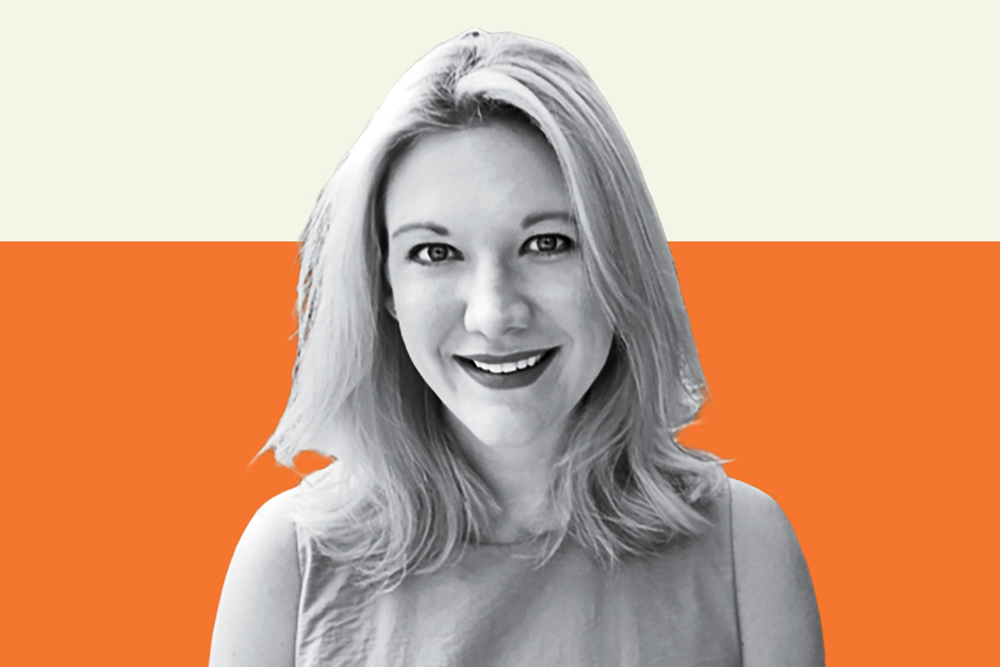
凯瑟琳·博伊尔(Katherine Boyle)
专注领域:美国活力
加入时间:2021年
凯瑟琳·博伊尔与大卫·乌利维奇(David Ulevitch)负责确定公司的亲美投资主题。
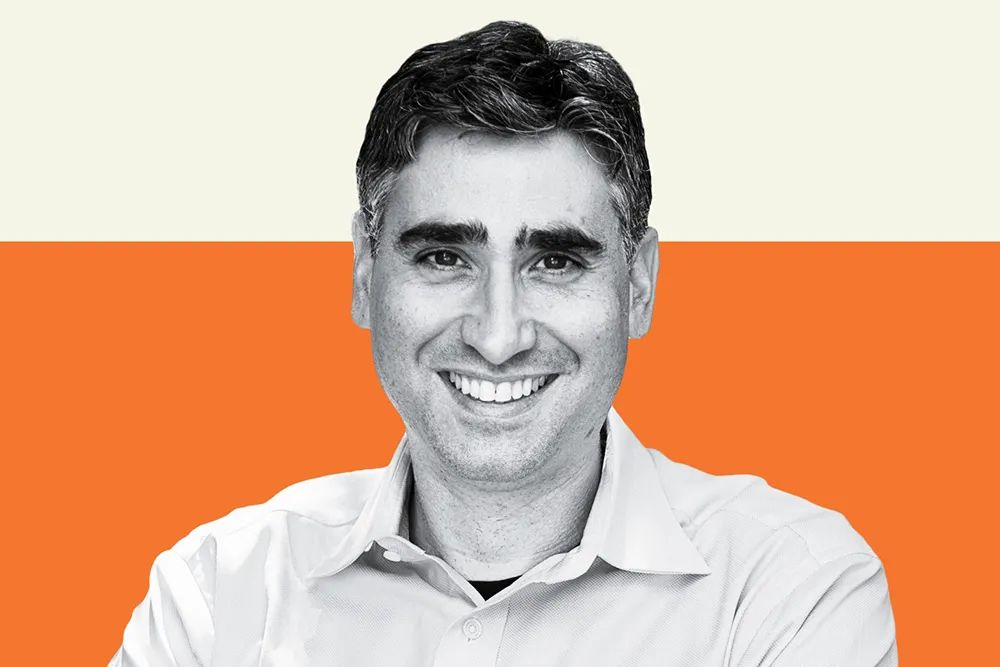
马丁·卡萨多(Martin Casado)
专注领域:创业
加入时间:2016年
卡萨多拥有斯坦福大学的计算机科学博士学位,他创建的Nicira公司后来被VMware以12.6亿美元收购。

康妮·陈(Connie Chan)
专注领域:消费
加入时间:2011年
作为a16z首位从内部晋升的普通合伙人,康妮·陈目前已经成为深谙中国消费科技发展动态的顶级专家。

克里斯·迪克森(Chris Dixon)
专注领域:加密货币
加入时间:2012年
迪克森是比特币(Bitcoin)的早期信徒,领导a16z在2013年大举投资Coinbase。事实证明,这是该公司历史上最关键的一笔交易。
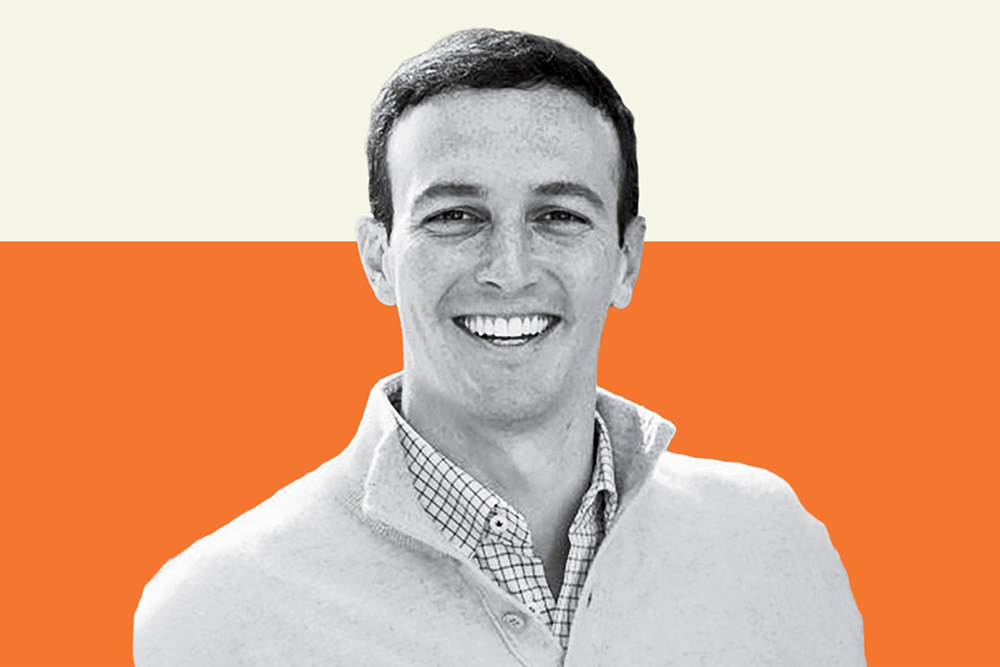
大卫·乔治(David George)
专注领域:成长型股票,公开市场
加入时间:2019年
乔治正在推动a16z进军股市,以开启新的投资机会。
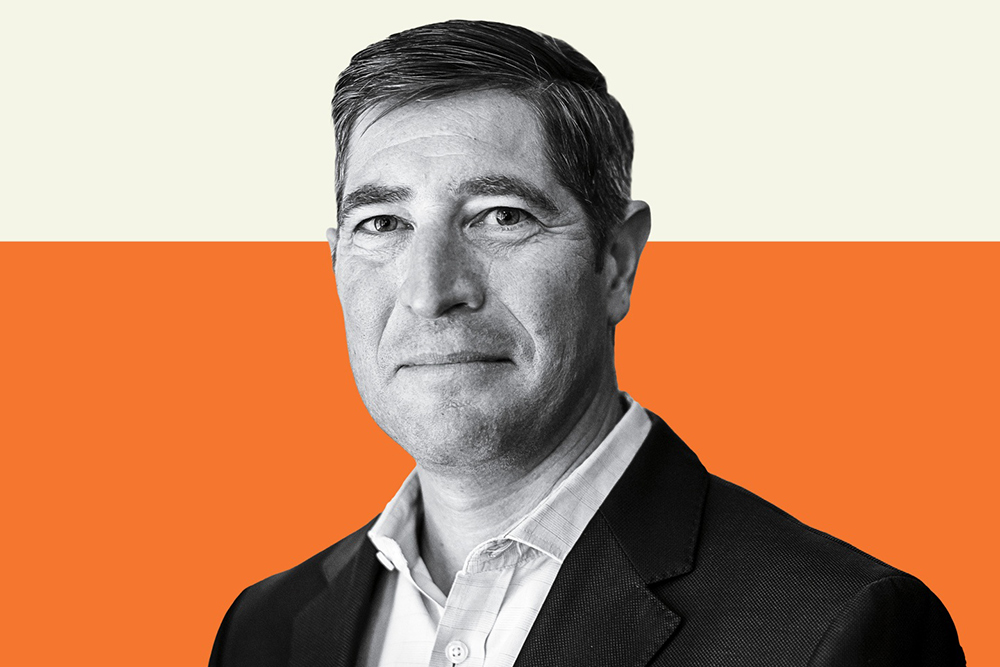
斯科特·库普尔(Scott Kupor)
专注领域:投资者关系
加入时间:2009年
库普尔是a16z的首位员工,目前负责引领公司向私人财富管理领域扩张。
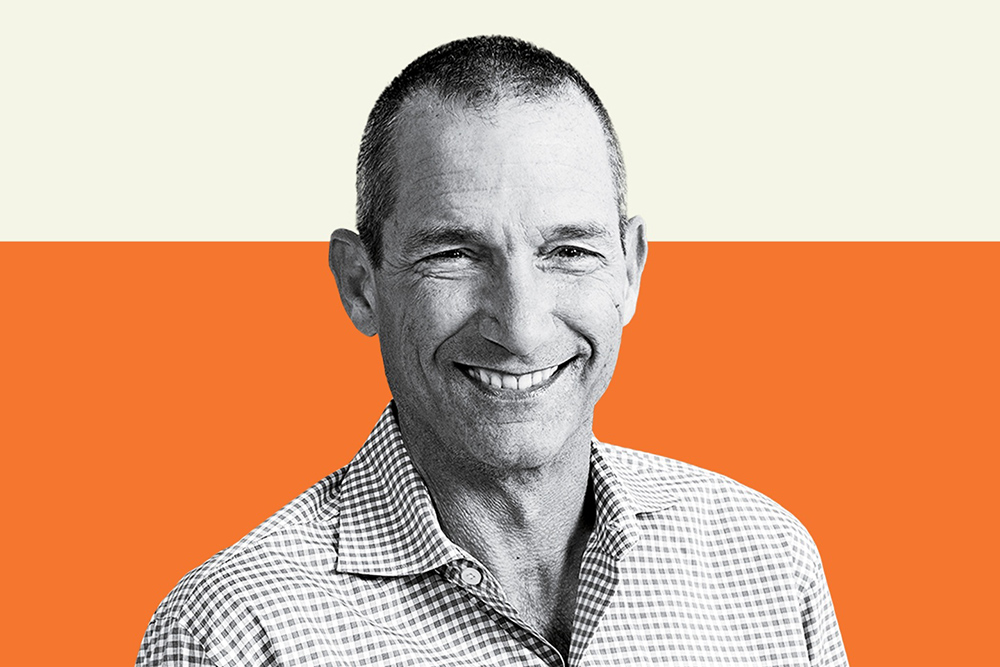
杰夫·乔丹(Jeff Jordan)
专注领域:消费
加入时间:2011年
这位OpenTable的前首席执行官在50多岁时成为一位风险投资家,此前曾经在迪士尼(Disney)和eBay任职。目前还担任爱彼迎的董事。

克里斯·莱昂斯(Christopher Lyons)
专注领域:web3,媒体
加入时间:2013年
莱昂斯帮助a16z推出文化领导力基金,其投资者包括纳斯和凯文·哈特等名人。
十年来的热门交易和成功案例
三笔有价值的投资:
Databricks
a16z参与首轮融资:2013年
目前价值:310亿美元
在本·霍洛维茨领投了这家云数据库公司2,500万美元的A轮融资之后,a16z又领投了四轮融资。
Fivetran
a16z参与首轮融资:2019年
目前价值:56亿美元
a16z是数据集成初创公司Fivetran两轮融资的主投资人,总投资额为6亿美元。
Deel
a16z参与首轮融资:2020年
目前价值:120亿美元
在新冠疫情刚刚爆发的时候,a16z就向Deel投资了1,400万美元,这家远程招聘公司的估值随后飙升。
三笔获得巨额回报的投资:
Coinbase
首次投资:1.25亿美元估值;2013年
退出估值:1,000亿美元
在这个大获全胜的风投案例中,a16z最终向投资者返还了40亿美元。
GitHub
首次投资:7.5亿美元估值;2012年
退出估值:75亿美元
a16z为GitHub总额1亿美元的A轮融资提供了资金。六年后,这家公司被微软收购。
Slack
首次投资:共同领投1,060万美元;2011年
退出估值:195亿美元
a16z投资了一家由斯图尔特·巴特菲尔德(Stewart Butterfield)领导的游戏公司。游戏业务失败后,该公司改名为Slack。
本文另一版本登载于《财富》杂志2022年12月/2023年1月刊,标题是《风投巨头的冒险:a16z想征服金融世界》(A venture giant’s risky moonshot: a16z’s high-stakes mission to conquer the rest of the financial world)。
埃里克·纽科默(Eric Newcomer)是一名独立记者,他出版了时事通讯Newcomer,内容涉及风险投资、创业公司和科技行业的内部运作。
译者:任文科
欢迎来到矩阵。马克·安德森(左)和本·霍洛维茨打造了一台强大的机器,帮助创业公司做大做强,同时也为他们自己和投资者赚得巨额回报。
今年11月的第一周,两位声名显赫的风投大佬,马克·安德森和本·霍洛维茨,在财力雄厚的捐赠基金、主权财富基金和养老金计划等支持者的面前上演了一场秀。
为期三天的活动是在这家风投公司支持的在线平台Hopin上举行的。除线上活动之外,他们还在纽约市和旧金山的高档寿司店Pabu Izakaya盛情款待了100多位贵宾。
尽管令人晕眩的经济数据、俄乌冲突和美国中期选举等杂音,不停地干扰观众的注意力,但安德森·霍洛维茨公司(Andreessen Horowitz,简称a16z)的基金经理们还是言之凿凿地宣称,市场动荡和科技股暴跌其实是一个机会。
此时此刻,a16z的合伙人或许比以往任何时候都更需要给人留下深刻印象。
2021年年底,也就是a16z成立十年后,这家风投巨擘还在高歌猛进,旗下资产高达550亿美元,是2020年的三倍多。即使按照硅谷风投的高标准来看,这也是一个巨额数字。它所代表的,是a16z利用互联网热潮褪去后最好的科技投资窗口,积攒下来的创业和加密公司股权。
近一年后的今天,a16z 正在应对公司成立以来最糟糕的科技市场。今年迄今为止,曾经为公司斩获史上最高回报的数字货币交易平台Coinbase的股价暴跌了约80%。一些目前已经上市的投资项目,例如爱彼迎(Airbnb)和Affirm,也经历了股价暴跌的洗礼。包括Instacart在内,几家未上市的投资组合公司纷纷大幅下调估值。与此同时,随着一家头部加密货币交易所轰然倒塌,整个数字资产行业,连同a16z投下的数十亿真金白银,顿时陷入前途未卜的窘境。
“a16z曾经创下笑傲同业的佳绩……但今时不同往日。”哥伦比亚商学院(Columbia Business School)的教授莱恩·谢尔曼这样说道。
变幻莫测的市场让许多投资者成了惊弓之鸟,开始重估自己的赌注。事实上,并非只有投资者这样做。就连a16z自身也将目光投向风投业务之外的广阔领地,寻求转型为一家全能型金融机构,以利用新的资金池,并经受住创业融资环境的无常变化。
这场变革始于几年前,但在今天显得尤为迫切。其目的是帮助公司重新定位,最终成为一家堪比高盛集团(Goldman Sachs)和摩根大通(J.P. Morgan)的金融大鳄。a16z将为有意投资科技领域的资金提供全方位服务。据消息人士透露,该公司拟定于2023年1月推出私人财富管理服务,为企业高管的个人资金开启投资之门。此前效力于泛大西洋投资集团(General Atlantic)的大卫·乔治被委以开拓公开市场投资业务的重任。此外,越来越多的学者和政策专家受聘加入。a16z的在册员工人数目前已经超过500人,较2021年7月的240人大幅增加。
从某种意义上说,a16z正在践行它传授给创业公司的壮大秘诀——把发展作为第一要务,同时设法规避随之而来的致命风险。几乎可以肯定的是,凭借着过去七年筹集的350多亿美元资本,a16z每年仅管理费一项就能够进账约5亿美元。随着公司不断开辟新市场,这个数字注定会继续攀升。
“他们正在进行大量试验。”一位a16z的前投资合伙人表示,“在我看来,一些项目免不了会失败。但反过来说,其中一些会大获成功。”
出于诸多原因,风投公司,尤其是a16z或许不能继续扩张下去。一方面,不断增长的基金规模和赌注,恐怕难以带来足以吸引有限合伙人的超额回报。另一方面,a16z可能会发现,在迥异于私人市场的公开市场上,它无法像过去那样游刃有余。此外,一些明星合伙人或许不甘心继续在滚滚车轮上充当一个籍籍无名的齿轮,他们可能会另起炉灶,打造自己的品牌。
与此同时,51岁的联合创始人马克·安德森不断卷入各种风波。身为Facebook董事的他,最近安排a16z出资支持两位遭到这家社交媒体放逐的高管创建新公司。安德森对媒体日益鄙视。在他的推动下,a16z豪掷近4亿美元襄助埃隆·马斯克以440亿美元的价格收购推特(Twitter),而这笔历经波折的收购交易几近沦为一场闹剧。在这些交易中,安德森将“创始人至上”的理念体现得淋漓尽致,但在风投世界之外,这种投资方式很难获得认可。
尽管a16z对转型计划三缄其口,合伙人也不愿意公开谈论此事,但《财富》杂志还是采访到了二十多位内部人士、有限合伙人、投资组合公司,以及前合伙人和风投对手,从而有机会更清晰地窥探风投行业中最具雄心的“探月计划”。
根据安德森的描述,他的公司是一扇引领创业者进入“矩阵”(Matrix)的门户。在那里,创业者可以突破传统商业现实的预期和束缚,按照自身意愿来塑造宇宙。安德森在今年10月发布的YouTube节目中表示:“每当创始人选择跟我们合作,霍洛维茨和我经常说的一句话是,这就像插入矩阵——你由此进入了一个任你大展宏图的世界。”在a16z重新起航之际,这两位传奇风投家自身或许也需要这个概念的护佑。
牛仔资本家
2011年,马克·安德森发表的名作《为什么软件正在吞噬世界》(Why Software Is Eating the World)引发巨大反响,而彼时的a16z已经惹人注目地进驻毗邻硅谷,风投云集的沙山路(Sand Hill Road)。
安德森作为网页浏览器之父的神秘感,本·霍洛维茨因为操盘多家创业公司而享有的公信力,以及公关专家玛吉特·温马赫斯卓越的营销能力,为这家公司创造了一种精英光环,尽管它只是刚刚加入风投俱乐部的新成员。
2009年,两位创始人推出价值3亿美元的首期基金,并积极接受媒体采访,慷慨分享奋斗秘史。他们告诉《财富》杂志,1996年,当时供职于网景(Netscape Communications)的霍洛维茨对高层向媒体泄露消息深感不满,随即给老板发了一封尖酸刻薄的电子邮件。
他的老板,时任网景首席执行官的马克·安德森回复称:“我们快要被微软(Microsoft)搞死了!搞死了!搞死了!是你在摧毁公司的价值,这完全是服务器产品经理的错。我就想帮个忙。下一次,你自己去接受那该死的采访吧,混蛋!”
两年后,即1998年,安德森以42亿美元的价格将网景卖给了美国在线(AOL)。随后,他和霍洛维茨联手创办了数据中心自动化公司Loudcloud,并在2007年以16亿美元的价格将其出售给了惠普(Hewlett-Packard)。
科技世界的权力搭档:20世纪90年代,现年51岁的马克·安德森(左)和56岁的本·霍洛维茨在互联网先驱网景公司首次合作。一位前合伙人表示,他们经常选择在公开场合反驳对方的观点,以鼓励员工挑战彼此的假设。
接下来,他们就一头扎进风投世界。不苟言笑的霍洛维茨负责公司运营。具有超凡魅力和远见卓识的安德森,则是公司的形象代言人和核心卖点:这是一只由创始人建立、面向创始人的基金,拥有庞大的运营团队和深厚的行业人脉,致力于帮助创业公司做大做强。
“创始人至上”的理念贯穿于公司运作的方方面面。与创始人会面每迟到一分钟,合伙人就会被罚款10美元。拒绝创业公司的融资方案后,合伙人必须在第一时间说明具体原因。对于那些遭到拒绝的创始人,公司还会进行名为“净推荐人得分”(Net Promoter Score)的反馈调查,以评估其融资体验。
“所有人都怕惹创始人不高兴,我觉得这是一件好事情。”一位前投资合伙人说。
公司文化鼓励员工挑战彼此的假设。“为了推动公司上下践行这种精神,马克和本经常选择在公开场合反驳对方的观点。”另一位前合伙人表示。
a16z的普通合伙人拥有签发支票的自主权。用另一位前合伙人的话说,这是一种“单激发触动”模式:每位合伙人都可以支持自己信任的创始人,哪怕其他合伙人怀有疑虑。
“他们正在做出重大转变,这一点我很欣赏。这真正体现了牛仔资本家的精神。”一位来自风投对手的合伙人这样评价a16z。
为了赢得交易,a16z从一开始就拿出了不怕花钱的劲头,并取得了一些重大胜利。2009年,公司斥资5,000万美元收购了Skype约2%的股份。仅仅两年后,微软就豪掷85亿美元将这家视频服务商揽入怀中,a16z由此净赚高达三倍的回报。
加密货币的投资哲学
到2015年,a16z已经成为硅谷最具人气的投资者,频频与红杉资本(Sequoia Capital)和基准资本(Benchmark)等头部风投机构展开正面交锋。那一年,《纽约客》(The New Yorker)发表了一篇热情讴歌安德森的人物特稿。在这篇报道中,安德森自诩为美剧《宋飞正传》(Seinfeld)的主角杰瑞·宋飞,而将同城对手、基准资本的比尔·格利贬为该剧的大反派纽曼。
但在某种程度上,用基准资本比照a16z并不恰切。诚然,两家公司在激烈争夺基准资本赖以生存的早期阶段交易,但a16z还在基准资本的身前和身后竞争。也就是说,它在角逐每一个融资阶段的风投机会。
在百舸争流的创业融资水域上,如果说基准资本是一艘永立潮头的赛艇,那么a16z就是一艘随时准备驶向任何战区的航空母舰。
加密货币成为这种风投运作模式的早期范例。拥有哲学硕士学位的前创始人克里斯·迪克森于2012年加入a16z。一年后,他领投了加密货币交易所Coinbase价值2,500万美元的B轮融资。
为了击败风投对手,a16z动用了令人艳羡的人脉网络。有一次,Coinbase的创始人布莱恩·阿姆斯特朗和弗雷德·埃尔萨姆去霍洛维茨的家里观看一场电视直播的拳击赛,万万没有想到说唱歌手纳斯突然造访。纳斯后来成为a16z文化领导力基金的有限合伙人投资者。
2013年投资Coinbase时,a16z给予了它1.25亿美元的估值。这笔交易最终创下公司历史上金额最高的回报。2021年4月,在这家数字货币交易平台通过直接上市登陆公开市场之后,a16z旋即向投资者返还了价值40亿美元的Coinbase股票。
这笔数目惊人的意外之财,足以偿还加密基金的投资成本——外加一些收益。此举让a16z赢得了投资者的深情厚谊(特别是因为有限合伙人能够赶在加密货币崩盘前锁定收益)。随着公司开始追逐新机会,这种情谊应该会派上用场。不过,正如一位投资者对《财富》杂志所言,a16z必须持续创造好业绩。“这家公司和他们的合伙人确实厉害,让我们印象深刻,但无论一家公司的招牌多么耀眼,如果变得太大,业绩差强人意,我们就会转身离开。”这位投资者说。
轰鸣的赚钱机器
自成立以来,a16z总共筹集了逾350亿美元,其中包括45亿美元的加密基金、50亿美元的成长型基金、25亿美元的创业基金和15亿美元的生物基金——所有这些都是在2021年筹募的。
巨额资本意味着巨额管理费。是的,无论投资业绩如何,有限合伙人每年都要付给风投家一笔管理费。就以最新推出的一只加密基金为例,a16z收取的管理费率高达2.5%。也就是说,这只价值20亿美元的基金每年能够创造5,000万美元的管理费。按类似的费率计算a16z自2016年以来筹募的基金,不难算出,这家公司每年都能够获得约5亿美元的管理费收入。
批评人士指责a16z不停地“堆砌费用”,筹集的海量资本让公司不必依赖投资实际表现的分成,仅靠管理费就赚得盆满钵满。随着这家公司挺进金融市场的不同领域,不断增长的资产目录将为其创造更多的管理费收入。这一模式类似于大型银行和私募巨头的经营方式——通过扩大投资重点,这些机构积累了数十亿美元的资产。
灵感之源就在马克·安德森的办公室,那里挂着一张约翰·皮尔庞特·摩根的照片。这位镀金时代金融家的同名银行如今是全球最大的银行之一,坐拥近4万亿美元的资产。
“我认为他打算建立一家这样的金融机构。”一位前合伙人如是推测安德森的磅礴野心。
安德森喜欢引用摩根的格言,动辄就提及这位商界巨子资助托马斯·爱迪生发明灯泡和其他创新,进而改变世界的传奇往事。在公司内部,a16z的合伙人经常援引摩根的一句话作为战略箴言。他们告诉新员工,这家公司寻求“以一流的方式成就一流的事业。”
今年7月,a16z宣布将在纽约、迈阿密和洛杉矶等地开设分公司,并声称这是与时俱进之举,旨在助力公司进驻云端。但人们很难忽视这份声明背后蕴含的勃勃雄心:不再满足于硅谷风投身份的a16z正在重新定义自身使命。
一位前合伙人透露称,a16z计划将员工人数增至700人,尽管它已经是最大的风投公司之一。
长期负责管理投资者关系的斯科特·库普尔开始打造剑指Iconiq Capital的理财产品。后者是一家顶级家族财富管理机构,拥有一批星光闪耀的高净值客户,其中包括马克·扎克伯格、微软首席执行官萨蒂亚·纳德拉和著名影星汤姆·汉克斯。a16z将这项举措称为Perennial,预计将在2023年1月开始融资,牵头人是新近加盟的Jordan Park Group的前首席投资官米歇尔·德尔·布诺。
此举意在帮助那些事业蒸蒸日上的创始人打理个人资产,就像投资银行在承销IPO之后继续为客户提供其他服务一样。
此外,a16z也在加强政治博弈,积极倡导华盛顿对加密货币采取友好的监管政策。今年早些时候,a16z聘请了这一领域的两位领先思想家,即哥伦比亚大学(Columbia University)的工程学教授蒂姆·拉夫加登和斯坦福大学(Stanford University)的计算机科学和电气工程教授丹·博纳来领导加密研究工作。
随着规模不断扩大,同事们逐渐不知道彼此在做什么,企业内部也出现了所谓的“文化漂变”现象,所有这些都是快速增长的组织经常面临的挑战。比如,一项早期政策规定,a16z的投资者必须拥有创业公司的运营经验,但这项政策现在已经没有人遵循了。
一些创始人揣测,鉴于这家风投公司拥有如此多重量级投资,它可能无法提供年轻企业所需要的那种手把手指导。但两家投资组合公司的创始人表示,与他们联络的合伙人和运营者都非常上心。
其中一位透露称:“他们的业务确实做得很大。但跟我们通话的时候,(a16z合伙人)迪克森显然在专注于我们做的事情,注意力并没有过于分散。”
新冠疫情时期的投资之难
在2014年出版的管理学著作《创业维艰》(The Hard Thing About Hard Things)一书中,56岁的本·霍洛维茨告诉读者,平庸的公司之所以平庸,神奇的公司之所以神奇,“其差异往往在于,你是鼓励员工进行创造性冒险,还是对他们实施过于严苛的问责。”
随着a16z的规模和野心越滚越大,在风险和问责之间保持适当平衡的能力,就变得以往任何时候都更加重要。就像投资世界的众多参与者一样,a16z也为新冠疫情期间爆发的科技估值热潮推波助澜,做了一些现在看来很糟糕的交易。
例如,在“无聊猿猴数字藏品”(Bored Ape NFTs)创造者4.5亿美元的“种子轮”融资中,a16z购买了大量股份。这家成立仅一年的公司由此获得高达40亿美元的估值。自那时起,数字藏品行业风光不再,销售额较今年1月的峰值暴跌了97%。这轮暴跌还可能危及a16z对数字藏品市场OpenSea的投资。
Launch House,一个让年轻企业家共同生活一个月的创业孵化器,也面临大麻烦。据新闻网站Vox报道,这个创业空间内部发生了多起令人不安的事件,甚至浮出性侵指控。其中有几起据称就发生在2021年,a16z领投1,200万美元融资轮的几个月前。
此外还有Clubhouse。与其他项目相比,这款音频聊天应用程序或许最能够展现a16z投资方式的力量和缺憾。
a16z普通合伙人安德鲁·陈在其领投的一系列交易中,不断推高Clubhouse的估值:从2020年5月的8,000万美元、2021年1月的10亿美元,一路上涨到2021年5月的40亿美元。
与此同时,a16z的合伙人倾力协助这家音频聊天室开发内容。作为a16z文化领导力基金的另一位有限合伙人,喜剧演员凯文·哈特在这款应用程序上主持一档节目。安德森经常在Clubhouse上发表演讲;霍洛维茨的太太费莉西亚·霍洛维茨定期在这款应用程序上举办晚宴,邀请名人嘉宾讨论政治和文化话题。
但Clubhouse的人气很快就消退了,a16z不得不减弱推广力度。此前还负责领投Launch House的安德鲁·陈最近离开了消费投资团队,搬到洛杉矶,并将注意力转移到游戏投资业务上。
据《华尔街日报》(Wall Street Journal)报道,曾经是a16z明星产品的加密基金在今年上半年缩水了40%,波动剧烈的加密货币让这家公司承受着巨大风险。尽管目前还不清楚a16z究竟持有多少加密货币,但随着这种数字货币的价格持续下落,产品信息披露中那段提醒有限合伙人的注意事项——“投资资本有可能遭受严重损失,甚至化为乌有”——突然令人惊醒起来。
今年11月初,加密货币交易所FTX宣告破产。尽管a16z不会因此承受直接风险,但其加密资产不可能逃脱这场冲击。令人震惊的监管缺失让FTX的创始人萨姆·班克曼-弗里德走上了自我毁灭之路。这提醒人们,过于听从创始人有可能酿成多么严重的后果。
如果说最近有什么变化的话,那就是a16z对创始人愈加偏袒。今年8月,安德森在一篇谈论美国住房危机的博文中大肆宣扬对Flow的投资。Flow是一家致力于改善租房状况的创业公司。其创始人不是别人,正是因为共享办公运营商WeWork估值暴跌而声名狼藉的亚当·诺伊曼。
几个月后,安德森投资了一家由安卓系统(Android)的创建者安迪·鲁宾领衔的创业公司。《纽约时报》(New York Times)曾经在2018年报道称,鲁宾被控在谷歌(Google)工作期间与一名员工发生不当性行为,最终获得9,000万美元的秘密离职补偿。但他本人对这些指控矢口否认。
一起与马斯克收购推特有关的诉讼,曝光了安德森与这位亿万富翁的往来信息。这些信息表明,安德森愿意将投资者的大笔资金押在一个人身上,而且没有什么约束。
在一封写给马斯克的邮件里,安德森主动表示:“我的成长型基金将投资2.5亿美元,没有任何额外要求。”
在这笔价值440亿美元的交易中,a16z最终投入了近4亿美元。就连马斯克本人也承认收购价定得过高。专注于加密投资的a16z合伙人斯里拉姆·克里希南目前兼任马斯克的顾问。这位亿万富翁最近对推特的强势改革变得越来越不可预测,已经损害了他作为一位成功企业家的声誉。
“在我看来,这是最令人震惊的一点。”谈到a16z没有对推特收购案进行尽职调查时,哥伦比亚大学的教授谢尔曼指出,“如果我是那只基金的有限合伙人,我绝对就会拍案而起。什么问题都不问,就主动入局,说:‘我要投资。’——这甚至都不是尽职调查的范畴。”
超越硅谷
安德森浅饮了一口雅沐特贪婪天使10年特别版(Amrut Greedy Angels 10 Year Old),这款威士忌的单瓶售价达842美元。那是今年5月,科技股正在以自由落体的姿态急坠而下。
“我们将继续参与市场,继续开展业务,继续做融资轮,继续投资。”他说,“但如果股价和经济活动持续低迷,企业的估值肯定就要重新设定。"
安德森不是在接受美国消费者新闻与商业频道(CNBC)或者彭博电视台(Bloomberg TV)的采访,而是在参加同事克里希南和他的妻子阿尔蒂·拉马穆尔西主持的YouTube节目《好时光秀》(Good Time Show)。在接下来的90分钟里,安德森侃侃而谈,从科技动态一直谈到他最喜欢的表情包。
就像许多有财力恣意行事的人一样,安德森喜欢面对一群友好的观众。a16z建立了自己的媒体运营业务,直接向受众传播讯息,这样就不必把信息控制权让渡给中介机构。推特也是安德森最喜欢的媒体——或许是因为他可以屏蔽一些犯有不明过失的用户。
最近,安德森开始在推特上发布长长的推荐书单。他最喜欢的作家之一是詹姆斯·伯纳姆,其著作包括《马基雅维利主义者》(The Machiavellians)和《管理革命》(The Managerial Revolution)。这些书——其中一些可以追溯到20世纪40年代——似乎在暗示安德森对精英阶层心生厌恶,并开始质疑美国政治,尽管他近年来的政治立场一直模棱两可。安德森一度是美国前总统贝拉克·奥巴马的支持者,后来又捐款支持共和党人米特·罗姆尼。今年11月,安德森发推嘲讽了一番那些据称要深挖其个人生活的记者。他说自己没有资助政治候选人,也没有“策划任何寻求颠覆美国民主制度的行动,更无意发动政变。”
如果说a16z有什么显然融合了政治考量的投资,那就是合伙人凯瑟琳·博伊尔率先提出的亲美投资理念:“美国活力”。安德森和霍洛维茨给这项战略开了绿灯。近来,a16z一直在招募投资者,以加大对国防科技、航空航天、教育、住房和交通领域的投资。
但安德森的原则有时也含糊不清。今年8月,这位撰写基础设施投资宣言《是时候建设了》(It’s Time to Build)的风投大咖与妻子联名签署了一份完美体现“邻避效应”的公开信,强烈反对在他们所居住的加利福尼亚州阿瑟顿建造新住宅。这件事情被曝光后,安德森顿时成了媒体广泛嘲笑的对象。
这段插曲展现了一种与现实脱节的尴尬形象,与a16z传递的信息和远大抱负背道而驰——毕竟,这家公司声称要将目光投向硅谷狭隘的视野之外。科技新闻媒体The Information最近报道称,一些投资者对a16z在诺伊曼身上投下重注,斥巨资助力马斯克收购推特等高风险行为颇为不满。
就在a16z勠力转型之际,一个问题浮出水面:掌舵者会根据实际情况和客户需求来调整自身的雄心壮志,还是像一位过于自信、不愿意改变航向的创业公司首席执行官那样,执拗地深锁在自己的矩阵中?
多年前,马克·安德森曾经撰文解释为什么有人不想加入创业公司,并谈到创始人陷入错觉的危险。“首先,务必要意识到,创业会让你坐上情绪过山车,经历前所未有的体验。”他写道,“前一天,你还欣喜若狂地确信,你将主宰整个世界。一天后发现,过不了几周你将迎来灭顶之灾。那一刻,天仿佛要塌下来了。然后,这一切又会重来一遍。”
a16z团队的骨干成员
安德森·霍洛维茨所代表的,不只是公司门牌上的两个名字。这是一家拥有约500名员工的大机构。一支实力雄厚且不断增长的投资合伙人和运营者团队,正在引领这家风投巨擘持续扩张,但公司高层仍然缺乏多样性。以下是这支团队的骨干成员。
凯瑟琳·博伊尔(Katherine Boyle)
专注领域:美国活力
加入时间:2021年
凯瑟琳·博伊尔与大卫·乌利维奇(David Ulevitch)负责确定公司的亲美投资主题。
马丁·卡萨多(Martin Casado)
专注领域:创业
加入时间:2016年
卡萨多拥有斯坦福大学的计算机科学博士学位,他创建的Nicira公司后来被VMware以12.6亿美元收购。
康妮·陈(Connie Chan)
专注领域:消费
加入时间:2011年
作为a16z首位从内部晋升的普通合伙人,康妮·陈目前已经成为深谙中国消费科技发展动态的顶级专家。
克里斯·迪克森(Chris Dixon)
专注领域:加密货币
加入时间:2012年
迪克森是比特币(Bitcoin)的早期信徒,领导a16z在2013年大举投资Coinbase。事实证明,这是该公司历史上最关键的一笔交易。
大卫·乔治(David George)
专注领域:成长型股票,公开市场
加入时间:2019年
乔治正在推动a16z进军股市,以开启新的投资机会。
斯科特·库普尔(Scott Kupor)
专注领域:投资者关系
加入时间:2009年
库普尔是a16z的首位员工,目前负责引领公司向私人财富管理领域扩张。
杰夫·乔丹(Jeff Jordan)
专注领域:消费
加入时间:2011年
这位OpenTable的前首席执行官在50多岁时成为一位风险投资家,此前曾经在迪士尼(Disney)和eBay任职。目前还担任爱彼迎的董事。
克里斯·莱昂斯(Christopher Lyons)
专注领域:web3,媒体
加入时间:2013年
莱昂斯帮助a16z推出文化领导力基金,其投资者包括纳斯和凯文·哈特等名人。
十年来的热门交易和成功案例
三笔有价值的投资:
Databricks
a16z参与首轮融资:2013年
目前价值:310亿美元
在本·霍洛维茨领投了这家云数据库公司2,500万美元的A轮融资之后,a16z又领投了四轮融资。
Fivetran
a16z参与首轮融资:2019年
目前价值:56亿美元
a16z是数据集成初创公司Fivetran两轮融资的主投资人,总投资额为6亿美元。
Deel
a16z参与首轮融资:2020年
目前价值:120亿美元
在新冠疫情刚刚爆发的时候,a16z就向Deel投资了1,400万美元,这家远程招聘公司的估值随后飙升。
三笔获得巨额回报的投资:
Coinbase
首次投资:1.25亿美元估值;2013年
退出估值:1,000亿美元
在这个大获全胜的风投案例中,a16z最终向投资者返还了40亿美元。
GitHub
首次投资:7.5亿美元估值;2012年
退出估值:75亿美元
a16z为GitHub总额1亿美元的A轮融资提供了资金。六年后,这家公司被微软收购。
Slack
首次投资:共同领投1,060万美元;2011年
退出估值:195亿美元
a16z投资了一家由斯图尔特·巴特菲尔德(Stewart Butterfield)领导的游戏公司。游戏业务失败后,该公司改名为Slack。
本文另一版本登载于《财富》杂志2022年12月/2023年1月刊,标题是《风投巨头的冒险:a16z想征服金融世界》(A venture giant’s risky moonshot: a16z’s high-stakes mission to conquer the rest of the financial world)。
埃里克·纽科默(Eric Newcomer)是一名独立记者,他出版了时事通讯Newcomer,内容涉及风险投资、创业公司和科技行业的内部运作。
译者:任文科
DURING THE FIRST WEEK of November, Marc Andreessen and Ben Horowitz, two of the most recognizable names in venture capital, put on a show for their firm’s backers—an audience of gold-plated endowments, sovereign wealth funds, and pension plans.
The three-day affair was held virtually on Hopin, an online platform funded by the VC firm, and paired with in-person dinners for more than 100 guests in New York City and at the posh San Francisco sushi restaurant Pabu Izakaya.
Amid a battery of distractions competing for the audience’s attention—from jarring economic data, to the war in Ukraine and midterm elections—Andreessen Horowitz’s coterie of fund managers stayed on message, framing the market turbulence and tumbling tech valuations as an opportunity.
More than ever before in the firm’s history, Andreessen Horowitz’s partners needed to impress.
By the end of last year—a decade after Andreessen Horowitz, or a16z, was founded—the firm was riding high with $55 billion in assets under management, more than three times the amount in 2020. That sum, massive by the standards of Silicon Valley venture capital firms, represented an accumulation of shares in startups and crypto tokens during the best time for tech investing since the dotcom boom.
Nearly a year later, Andreessen Horowitz is navigating the worst market for tech since the firm was founded. Coinbase, the company that generated the highest return ever for the firm, is down about 80% so far in the stock market this year. Share prices of other now-public a16z investments, such as Airbnb and Affirm, are also down sharply. And a few of its still-private companies, including Instacart, have cut their valuations significantly. Meanwhile, one of the largest exchanges in the crypto industry has collapsed, throwing the fate of the entire digital asset industry, where a16z has pledged billions, into question.
“Andreessen Horowitz has an awfully good track record to point to ... But that was then, and this is now,” says Len Sherman, a professor at Columbia Business School.
If investors are getting antsy and reassessing their bets in a shifting market, they’re not alone. Andreessen Horowitz is itself looking beyond the venture business, taking steps to become a more versatile financial creature that can tap new pools of capital and weather changes in the startup funding climate.
This evolution, begun a few years ago but all the more pressing today, aims to position the firm as a sort of Goldman Sachs or J.P. Morgan of the West. If there’s money to be put to work in technology, Andreessen Horowitz is there to play with it. The firm will launch a private wealth management service in January, opening the door to invest the personal funds of business executives, according to a source. A public market investing effort is being led by David George, formerly with General Atlantic. And an expanding collection of academics and policy wonks are being added to the payroll, which now numbers more than 500 people compared with 240 in July 2021.
In a sense a16z is following its own recipe for turning startups into large companies—prioritizing growth while hoping to dodge the potentially fatal dangers that come with it. Based on the more than $35 billion the firm has raised in the past seven years, a16z is almost certainly reaping about $500 million a year on management fees alone—a sum that stands to grow even more as the firm sprawls into new markets.
“They are running a lot of experiments,” says a former Andreessen Horowitz investment partner. “It seems to me relatively obvious that some will fail. The flip side is that some of them will work out.”
There are plenty of reasons why venture—and Andreessen Horowitz specifically—might not be able to keep scaling: Larger funds and bigger bets may hinder the outperforming returns that have attracted limited partners; Andreessen Horowitz may find it’s not as well suited for the public markets as it has been for the private ones; and star partners may leave in favor of building their own brand rather than being another cog in the wheel.
Meanwhile cofounder Marc Andreessen, 51, keeps leaping head-first into drama. Andreessen, a Facebook board member, recently invested the firm’s money in two ostracized technology executives’ new companies. He’s grown contemptuous of the media. He thrust the firm into Elon Musk’s chaotic $44 billion Twitter takeover with a nearly $400 million investment, underscoring a founder-first mindset toward investing that might not fly outside the venture world.
While the firm has been reticent about its plans, and its partners declined to discuss them on the record, Fortune spoke to more than two dozen a16z insiders, limited partners, and portfolio companies, as well as former partners and VC rivals, to get a clearer picture of the venture industry’s ambitious moonshot.
Andreessen describes his firm as a portal where entrepreneurs enter the “Matrix,” a place where people can cut through the expectations and barriers of conventional business reality and shape the universe to their will. “When founders come to work with us, the term that Ben and I use is, it’s like plugging into the Matrix—you basically get access to the world,” he said on one of the firm’s self-published YouTube shows in October. It’s a concept the duo may need for their own mission.
COWBOY CAPITALISTS
BY THE TIME Marc Andreessen published his seminal essay “Why Software Is Eating the World” in 2011, Andreessen Horowitz had already made a dramatic entry onto Sand Hill Road’s venture capital terroir.
Mixing Andreessen’s mystique as the father of the web browser, Ben Horowitz’s cred as a seasoned startup operator, and the in-house marketing prowess of PR pro Margit Wennmachers, the firm created an elite aura that overshadowed its newbie status in the venture club.
The two founders made the media rounds, sharing war stories, as they launched their $300 million inaugural fund in 2009. They told Fortune about a snarky email that Horowitz, upset about a media leak, sent his boss at Netscape Communications in 1996.
The boss, Netscape CEO Marc Andreessen, replied, “We are getting killed killed killed by Microsoft! You’re destroying the value of the company, and it’s 100% server product management’s fault. I’m just trying to help. Next time, do the f–--ing interview yourself. F--- you. Marc.”
Two years later, in 1998, Andreessen sold Netscape to AOL for $4.2 billion. He and Horowitz teamed up to launch Loudcloud, a data center automation company, then sold it to Hewlett-Packard in 2007 for $1.6 billion.
Venture was the next act. Horowitz, the no-nonsense manager, would run the firm. Andreessen, the charismatic visionary, would be its face in the public imagination and at the heart of its pitch: a fund for founders, built by founders, with an outsize operations staff and deep industry connections, to help startups scale.
The founder-first ethos was integrated throughout the firm’s operations. Partners were fined $10 for every minute they were late to a meeting with a founder. When a startup’s funding pitch is turned down, partners must provide a prompt response with a specific reason for the rejection. Turned-away founders are sent Net Promoter Score feedback surveys to gauge their experience.
“People are scared of getting founders upset, which I think is a good thing,” says the former investment partner.
Firm culture encourages staffers to challenge one another’s assumptions. “Marc and Ben make a point of openly disagreeing with each other to encourage that spirit throughout the firm,” another former partner said.
General partners at a16z have check-writing autonomy—a “single-trigger-puller” model, as a separate former partner describes it—allowing individual partners to back founders they believe in, even if their peers are more skeptical.
“I admire that they take big swings; they really embody the cowboy capitalist ethos,” a partner at a rival VC firm says of a16z.
Out of the gate, Andreessen Horowitz showed it wasn’t afraid to pay up to win deals, and scored some big wins. In 2009 it bought about 2% of video service Skype for $50 million. Less than two years later, Microsoft acquired Skype for $8.5 billion, netting a16z a threefold return.
THE CRYPTO PHILOSOPHY
BY 2015, Andreessen Horowitz had established itself as among Silicon Valley’s most in-demand investors, going toe-to-toe for deals against elite VC firms like Sequoia Capital and Benchmark. In a glowing profile of Andreessen published in The New Yorker that year, he referred to his crosstown rival, Benchmark’s Bill Gurley, as the Newman to his Jerry Seinfeld.
But in some ways, looking at Andreessen Horowitz in terms of Benchmark was a category error. While Benchmark and a16z battle fiercely for the early-stage deals that are Benchmark’s bread and butter, Andreessen Horowitz also competes for every other stage of venture capital investment—before and after Benchmark.
If Benchmark was a best-in-class race boat cruising the startup waters, Andreessen Horowitz was an aircraft carrier ready to steam toward wherever the action lay.
Cryptocurrencies offered an early demonstration of the model in action. Chris Dixon, a former founder with a master’s degree in philosophy, joined a16z in 2012. A year later he led a $25 million Series B funding round for the cryptocurrency exchange Coinbase.
To edge out a rival VC firm, a16z tapped into its “matrix” of connections. When Coinbase founders Brian Armstrong and Fred Ehrsam visited Horowitz’s home to watch a fight on television, they were greeted with a surprise visit by the rapper Nas, who would go on to become a limited partner investor in the firm’s “cultural leadership” fund.
The Coinbase investment, which valued the company at $125 million in 2013, would become Andreessen Horowitz’s highest-returning. When Coinbase went public via direct listing in April 2021, a16z returned $4 billion in Coinbase shares to investors.
The massive windfall—enough to pay back the crypto fund’s invested capital and then some—has earned the firm a reservoir of investor goodwill that should come in handy as it chases new opportunities (especially since limited partners were able to lock in the gains before the crypto crash). Still, as one a16z investor tells Fortune, the firm must continue to deliver. “We’ve been impressed with them and their partners ... But no matter how good the brand is, if a firm becomes too big and is no longer performing, we will leave it,” the investor said.
INSIDE THE MONEY MACHINE
ALTOGETHER Andreessen Horowitz has raised more than $35 billion since its founding, including a $4.5 billion crypto fund, a $5 billion growth fund, a $2.5 billion venture fund, and a $1.5 billion biofund—all just last year.
That translates into huge management fees—the annual dues that limited partners pay venture capitalists just to invest their money, regardless of performance. On one of the firm’s latest crypto funds, Andreessen Horowitz commanded a 2.5% fee, which would mean receiving $50 million a year on a $2 billion fund. Applying a similar fee to Andreessen’s funds raised since 2016, the firm is generating about $500 million in fees a year.
Critics accuse the firm of “stacking fees,” or raising so much money that it can profit off management fees alone without relying on carry—or its cut of the actual performance of its investments. As a16z expands into different areas of the financial markets, its growing catalog of assets should generate ever more management fees—a model with parallels to the enormous banks and private equity giants that accumulated billions in assets as they broadened their investing focus.
The inspiration is in Marc Andreessen’s office, where he keeps a picture of John Pierpont Morgan, the Gilded Age financier whose namesake bank is now one of the world’s largest, with nearly $4 trillion in assets.
“I think he intends to build an institution of that stature,” one former partner says of cofounder Andreessen.
Andreessen is fond of citing Morgan’s maxims and his example as a businessman who funded world-changing innovations like Thomas Edison’s light bulb. Internally, a16z partners often invoke a Morgan quote as a sort of strategic refrain: They tell new employees that the firm strives to be a “first-class business in a first-class way.”
In July, a16z announced it was expanding to locations such as New York, Miami, and Los Angeles—the firm billed it as a move to be in step with the times and to become “cloud-based,” but it was hard to miss the statement it made about the VC firm’s ambitions to redefine itself as more than just a Silicon Valley outfit.
Already among the largest VC firms, Andreessen Horowitz has plans to grow its headcount to nearly 700 people, says a former partner.
Scott Kupor, who has long managed the firm’s relationship with its investors, started building out a wealth management offering to compete with the likes of Iconiq Capital, whose roster of A-list clients includes Mark Zuckerberg, Microsoft CEO Satya Nadella, and celebrities like Tom Hanks. The firm is calling the effort Perennial and is expected to begin raising money this January, led by the recently hired Michel Del Buono, a former chief investment officer at Jordan Park Group.
The idea is to manage the personal assets of startup founders as their businesses and careers grow, similar to the way investment banks provide ongoing services to the companies whose IPOs they underwrite.
A16z is also stepping up its political game, becoming an influential advocate in Washington for crypto-friendly regulations. Earlier this year it hired two leading thinkers in the space: Tim Roughgarden, a Columbia engineering professor, and Dan Boneh, a computer science and electrical engineering professor from Stanford, to lead the firm’s crypto research efforts.
With size come all the challenges common to fast-growing organizations, from losing track of what colleagues do to cultural drift. An early policy mandating that investors at a16z have operator experience at a startup is no longer followed, for example.
Some startup founders wonder whether a firm with so many large investments can provide the kind of hand-holding a young business needs, though two current portfolio company founders say the partners and operators who work with them are incredibly attentive.
“They have grown significantly, but it’s clear that when [a16z partner Dixon] is on a call with us, he’s locked into what we’re doing and not spread too thin,” says one.
THE HARD THING ABOUT INVESTING DURING A PANDEMIC
IN HIS 2014 management book, The Hard Thing About Hard Things, Ben Horowitz, 56, tells readers that the difference between a mediocre company and one that’s magical is “often the difference between letting people take creative risk and holding them too tightly accountable.”
As Andreessen Horowitz snowballs in size and ambition, its ability to maintain the proper balance between risk and accountability is more critical than ever. Like much of the investing world, a16z was swept up in the tech valuation fever that erupted during the pandemic, resulting in some deals that now look batty.
The firm purchased a huge stake in the creator of Bored Ape NFTs, part of a $450 million “seed round” that gave the year-old company a $4 billion valuation. Since then industrywide NFT sales have cratered by as much as 97% from their January peak (a crash that could also affect a16z’s investment in NFT marketplace OpenSea).
Launch House, a startup that brings young entrepreneurs together for one-month-long co-living programs, has hired lawyers for an investigation after Vox reported on troubling incidents including allegations of sexual assault. Several allegedly occurred in 2021, months before Andreessen Horowitz led a $12 million funding round.
And then there’s Clubhouse, the audio chat app that perhaps more than any other a16z investment epitomizes the power, and flaws, of the firm’s approach to investing.
In a series of deals led by Andreessen Horowitz general partner Andrew Chen, the firm kept driving up the price of its own portfolio company: Chen invested in Clubhouse at an $80 million valuation in May 2020; a $1 billion valuation in January 2021; and a $4 billion valuation in May 2021.
Meanwhile a16z’s partners went all in on ginning up content for the audio chatroom company. Comedian Kevin Hart, another limited partner in a16z’s cultural leadership fund, hosted a session on the app. Andreessen was a regular speaker, and Horowitz’s wife, Felicia Horowitz, hosted a regular dinner party on the app where celebrity guests discussed issues like politics and culture.
But Clubhouse’s popularity soon fizzled, and Andreessen Horowitz eventually let up on its constant promotion. Chen, who was also the lead investor in Launch House, recently left Andreessen’s consumer investing team, moved to Los Angeles, and shifted his attention to investing in gaming companies for the firm.
Andreessen’s crypto fund, once its star performer, has shed 40% of its value in the first six months of this year, according to the Wall Street Journal, and the firm has taken on enormous risk by holding highly volatile cryptocurrency tokens. While it’s not clear exactly how many tokens the firm owns, the caveat in its disclosures reminding limited partners that they “could incur substantial, or even total, loss of capital,” suddenly looks frighteningly sobering as crypto prices crash.
While a16z had no direct exposure to FTX, the crypto exchange that went bankrupt in early November, the firm’s crypto assets are unlikely to escape the fallout. And the stunning lack of oversight that enabled FTX founder Sam Bankman-Fried to self-destruct is a reminder of the dangers in deferring too much to founders.
If anything, a16z has been leaning further into its founder bias lately. In August, Andreessen wrote a blog post about the U.S. housing crisis and trumpeted an investment in Flow, a startup that aims to make renting better. The founder of Flow is none other than Adam Neumann, of WeWork infamy.
A couple months later it was reported that Andreessen was backing a startup founded by Android creator Andy Rubin. The New York Times reported in 2018 that Rubin had been accused of sexual misconduct with an employee while at Google and was paid $90 million in a quiet exit package. Rubin has said in the past that the allegations are false.
Messages between Andreessen and Elon Musk, which emerged during a lawsuit related to Musk’s Twitter acquisition, revealed Andreessen’s willingness to bet large sums of his investors’ money on an individual, with seemingly few constraints.
“My growth fund is in for $250M with no additional work required,” Andreessen volunteered in a message to Musk.
The firm ended up investing closer to $400 million in the $44 billion deal, which Musk himself acknowledged was vastly overpriced. Sriram Krishnan, an a16z partner focused on crypto investing, is currently doing double duty as an adviser to Musk, whose reputation as a successful entrepreneur has become increasingly tarnished by his erratic stewardship of Twitter.
“To me that was the most egregious of all,” Columbia professor Sherman says of a16z’s lack of due diligence on Twitter. “If I were a limited partner in the fund from which that came, I would be absolutely outraged ... To jump in and say, ‘I’m in,’ with no questions asked—that doesn’t even belong in the same sentence as due diligence.”
LIFE BEYOND THE VALLEY
ANDREESSEN SIPPED from a glass of Amrut Greedy Angels 10 Year Old, a whiskey that sells for $842 a bottle. It was May of this year, and tech stocks were in free fall.
“We continue to be in market,” he said. “We continue to be in business. We will continue to do rounds. We’ll continue to make investments—but if this downturn in price and economic activity continues, your prices will definitely reset.”
Andreessen wasn’t speaking on CNBC or Bloomberg TV. He was on the Good Time Show, the YouTube show hosted by colleague Krishnan and his wife, Aarthi Ramamurthy. Over the next 90 minutes, Andreessen opined on everything from tech to his favorite memes.
Like many people with the means to do things their way, Andreessen enjoys a friendly audience. A16z has built its own media operation, allowing the firm to promote its message without ceding control to intermediaries. Twitter is also a favorite medium for Andreessen, who blocks users committing unspecified transgressions.
Lately, Andreessen has taken to tweeting long reading lists. One of his favorite writers is James Burnham, author of The Machiavellians and The Managerial Revolution. The books, some of which date back to the 1940s, seem to hint at Andreessen’s souring on elites and doubts about American politics, though the onetime Obama supporter who later donated to Republican Mitt Romney has kept his political affiliation ambiguous in recent years. In a sardonic tweet directed at reporters supposedly digging into his personal life this month, Andreessen said he was not—among other things—funding political candidates or “plotting any subversion of American democracy and/or coup attempts.”
If there’s any clear fusion of politics and investing in the firm, it’s in the concept of American dynamism, a pro-America investment thesis spearheaded by partner Katherine Boyle. Andreessen and Horowitz helped green-light the strategy, and the firm has been recruiting investors to ramp up bets on defense tech, aerospace, education, housing, and transportation.
But Andreessen’s principles have at times been muddled. In August, he was the subject of widespread media derision after it was revealed that the author of infrastructure investment manifesto “It’s Time to Build” had cosigned with his wife a NIMBYish letter opposing new housing in Atherton, Calif., where the couple live.
The episode marked an embarrassing moment of out-of-touchness that undermined a16z’s message and its aspirations of becoming a firm whose perspective extends beyond Silicon Valley’s narrow field of view. The Information recently reported that some Andreessen Horowitz investors are grumbling about the risky bet on Neumann and its pricey participation in Musk’s Twitter adventure.
As Andreessen Horowitz pushes forward with its transformation, the question is whether its leaders are capable of adjusting their ambitions to the reality on the ground and the needs of its clients or if, like an overly confident startup CEO unwilling to change course, the firm remains locked in its own matrix.
Marc Andreessen wrote about the dangers of delusion many years ago while making the case for why someone might not want to join a startup. “First, and most importantly, realize that a startup puts you on an emotional roller coaster unlike anything you have ever experienced,” he wrote. “You will flip rapidly from a day in which you are euphorically convinced you are going to own the world, to a day in which doom seems only weeks away and you feel completely ruined, and back again.”
*****
KEY PLAYERS ON TEAM A16Z
With a headcount of roughly 500, Andreessen Horowitz is more than the two names on the front door. A deep and growing bench of investing partners and operators are leading the firm’s expansion (although the top ranks still suffer from a lack of diversity). Here are a few key players on the team.
KATHERINE BOYLE
FOCUS: AMERICAN DYNAMISM
JOINED: 2021
Katherine Boyle co-leads the firm’s pro-America investment thesis, along with David Ulevitch.
MARTIN CASADO
FOCUS: ENTERPRISE
JOINED: 2016
A Stanford computer science Ph.D., Casado cofounded the startup Nicira, acquired by VMware for $1.26 billion.
CONNIE CHAN
FOCUS: CONSUMER
JOINED: 2011
The first person a16z promoted to general partner from within, Chan has emerged as an expert on China consumer tech.
CHRIS DIXON
FOCUS: CRYPTO
JOINED: 2012
An early Bitcoin believer, Dixon led the firm’s 2013 investment in Coinbase, which turned out to be its most pivotal.
DAVID GEORGE
FOCUS: GROWTH, PUBLIC MARKETS
JOINED: 2019
George is driving a16z’s push into public equities, opening the door to new investment opportunities.
SCOTT KUPOR
FOCUS: INVESTOR RELATIONS
JOINED: 2009
A16z’s first employee, Kupor has led the firm’s efforts to expand into private wealth management.
JEFF JORDAN
FOCUS: CONSUMER
JOINED: 2011
The former OpenTable CEO became a VC in his fifties after stints at Disney and eBay. He’s also on the Airbnb board.
CHRIS LYONS
FOCUS: WEB3 MEDIA
JOINED: 2013
Lyons launched the firm’s cultural leadership fund, which includes celebrity investors like Nas and Kevin Hart.
*****
A DECADE OF HOT DEALS AND HOME RUNS
3 VALUABLE INVESTMENTS:
Databricks
FIRST A16Z ROUND: 2013
CURRENT VALUE: $31 billion
Since Ben Horowitz led a $25 million Series A round in the cloud database com- pany, a16z has led four further rounds.
Fivetran
FIRST A16Z ROUND: 2019
CURRENT VALUE: $5.6 billion
A16z has been the lead investor in two funding rounds in data-integration startup Fivetran, totaling $600 million.
Deel
FIRST A16Z ROUND: 2020
CURRENT VALUE: $12 billion
The pandemic had just begun when a16z invested $14 million in Deel, a remote hiring startup whose valuation has since soared.
3 BIG RETURNS:
Coinbase
FIRST INVESTMENT: $125 million valuation; 2013
EXIT VALUE: $100 billion
In a VC grand slam, a16z returned $4 billion to its investors.
GitHub
FIRST INVESTMENT: $750 million valuation; 2012
EXIT VALUE: $7.5 billion
A16z funded GitHub’s entire $100 million Series A round. Six years later, Microsoft acquired it.
Slack
FIRST INVESTMENT: Co-led $10.6 million investment; 2011
EXIT VALUE: $19.5 billion
A16z invested in a gaming firm led by founder Stewart Butterfield. The game failed, the startup became Slack.
This story appears in the December 2022/January 2023 issue of Fortune with the headline, “A venture giant’s risky moonshot: a16z’s high-stakes mission to conquer the rest of the financial world.”
Eric Newcomer is an independent journalist who publishes Newcomer, a newsletter that covers the inner workings of venture capital, startups, and the tech industry.






